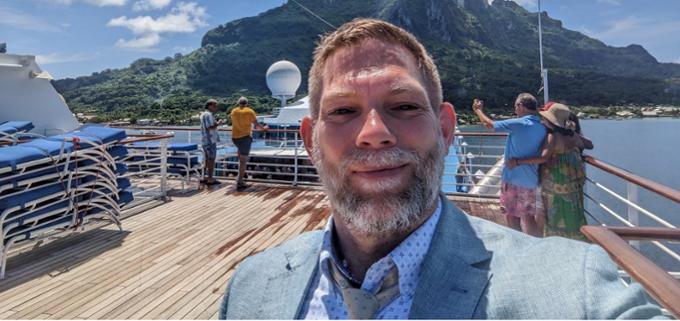Toby Sperlich, a cultural anthropologist and Associate Professor of Anthropology in the Faculty of Arts, feels lucky to call the South Pacific and ports of call in exotic locations such as Bora Bora, Easter Island, and Tahiti his second classroom. He says he has found an outlet off campus, aside from academic articles, where he feels it’s important to share his research and knowledge. Cruise lines use various terms for their onboard educational offerings — enrichment lectures, presentations, or edutainment —are a few of the terms. Sperlich calls what he does public pedagogy and refers to it as a second calling.
“Polynesia has more to offer than pretty beaches, great snorkeling, and colourful drinks with umbrellas. I feel it’s my responsibility to help cultivate understanding of the rich culture and history of the local people. I’ve had passengers come up to me after we docked somewhere to tell me what a difference it made for them to have learned about the local culture and people before visiting. So many express gratitude for gaining that knowledge,” says Sperlich.
They are a very engaged and captive audience and ask a lot of questions. I basically transform my academic lecture by summarizing exciting scientific, historical, or cultural points, then incorporate rich illustrations, local myths, and legends, as well as relatable personal experiences. It’s never too late to plant seeds. — Toby Sperlich, a cultural anthropologist and Associate Professor of Anthropology in the Faculty of Arts.
Originally from Germany, Sperlich received his PhD from Oxford and has lived and taught on the Prairies since 2005. His students away from the U of R are mainly sun-kissed retirees from the U.S., Canada, the UK, and Australia who are over 55 years old and unconcerned about rent money. Class is held in the same theatre where during the evening karaoke and magic shows ignite laughter in the happy seafarers. The 45-minute lectures take place on high-end cruises that last anywhere from 10 to 28 days with Sperlich often delivering multiple lectures on a single cruise. Topics such as “The Prehistoric Settlement of Polynesia,” “Tahiti: An Ancient Chiefdom at the Crossroads of Polynesia,” and “Surfing, Rugby, Cricket: Polynesian Sports Then and Now,” are on the manifest and typically between 250 to 300 passengers show up.
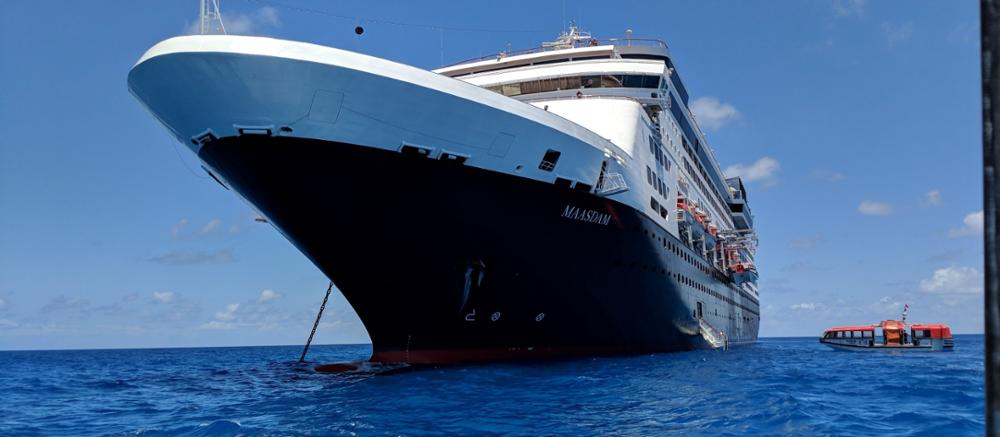
“They are a very engaged and captive audience and ask a lot of questions. I basically transform my academic lecture by summarizing exciting scientific, historical or cultural points, then incorporate rich illustrations, local myths, and legends, as well as relatable personal experiences. It’s never too late to plant seeds,” emphasizes Sperlich.
Place-based learning is considered the ultimate way to increase knowledge and develop appreciation. And as Sperlich points out, it is never too late to try destination-specific learning, especially when it’s included in the cost of your vacation voyage. The cruise passengers who attend Sperlich’s lectures are more likely to look out at the ocean and see more than a breathtaking azure landscape. They may be inspired to reflect on the historical timeline of the area, as well as the accomplishments and unique cultural aspects of Polynesians that Sperlich keenly shares. His goal is that when passengers disembark for a few hours to meander, shop, and eat among the thatched stalls that line the beach that they take a different approach to the people they meet.
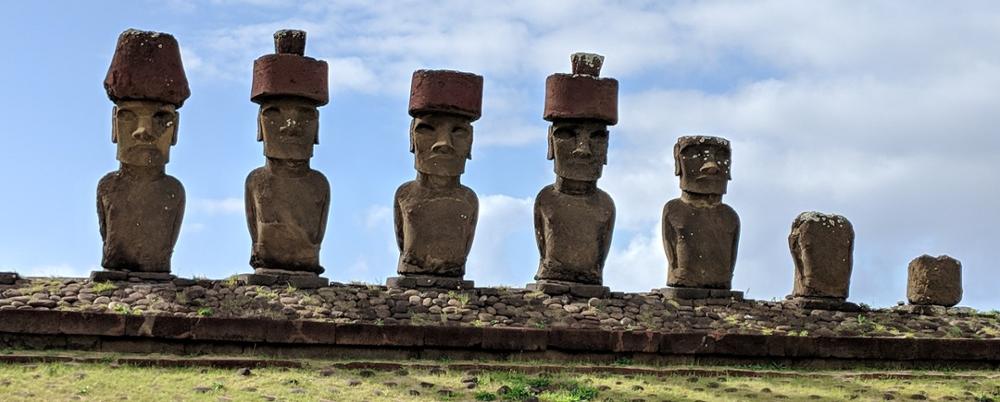
“I was a little daunted at first, but my goal is to give them a multi-dimensional experience versus only a beach so the passengers and the locals have a better and more meaningful experience of one another. Tourists don’t have time to go visit a knowledge keeper or elder when they disembark, so I do my best to expose them to well-researched and rich information. From experience and feedback, I can tell they have less judgement and see the locals less as the other and more relatable,” he suggests.
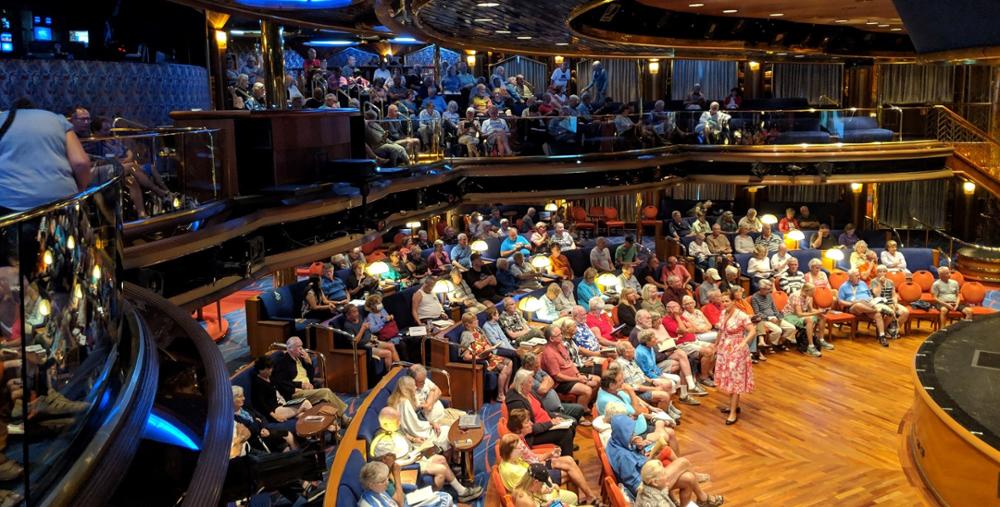
There is so much to learn about Polynesia. Did you know that the island of Bora Bora was once famous for its warriors, that there were no terrestrial mammals (humans, dogs, pigs, rats, etc.) living on any of the Polynesian islands until approximately 3,200 years ago when the first Polynesians arrived or that a third gender is a vital part of Tahitian society?
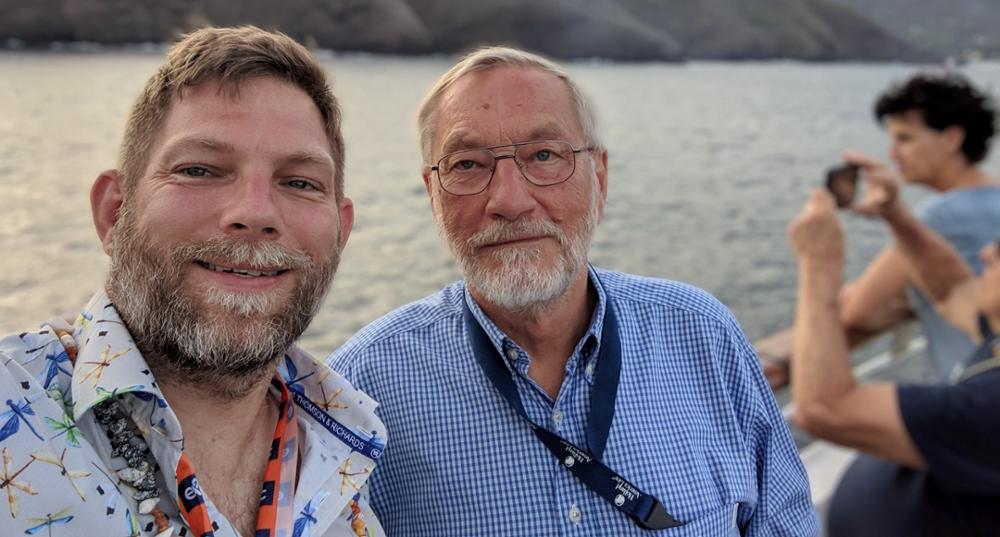
Yearning for more but no cruise ship vacation coming up? No problem. You can also find Sperlich at the Centre for Continuing Education (CCE) where he delivers free presentations on the “Anthropology of Cruise Ships” through the Lifelong Learning Centre. If you missed his presentation in February, be sure to watch the events calendar for the next offering. There are two other free community lectures coming up: “Who Needs Pronouns? Not me!” led by Dr. Shannon Dea, Dean of Arts and Professor of Philosophy at the U of R , on March 28; and, “Healing in Relationships” led by Sheila Unique, Relationship Coach, on April 11. All free community lectures are held on the beautiful and historic College Avenue campus.
Register now so you can attend a free community lecture through the Lifelong Learning Centre (LLC).
About the University of Regina
2024 marks our 50th anniversary as an independent University (although our roots as Regina College date back more than a century!). As we celebrate our past, we work towards a future that is as limitless as the prairie horizon. We support the health and well-being of our 16,700 students and provide them with hands-on learning opportunities to develop career-ready graduates. Our research enterprise has grown to include 21 research centres and 12 Canada Research Chairs and brings in more than $51.2 million in funding annually. Our campuses are on Treaties 4 and 6 - the territories of the nêhiyawak, Anihšināpēk, Dakota, Lakota, and Nakoda peoples, and the homeland of the Michif/Métis nation. We seek to grow our relationships with Indigenous communities to build a more inclusive future.
Let’s go far, together.
